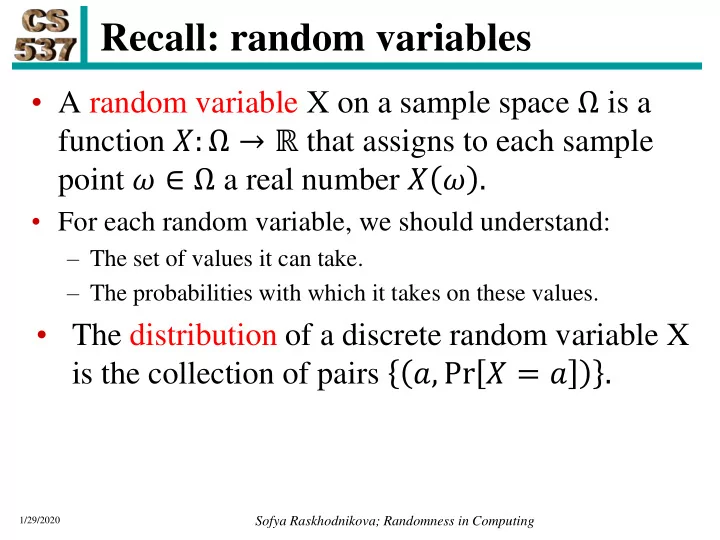

Recall: random variables • A random variable X on a sample space Ω is a function 𝑌: Ω → ℝ that assigns to each sample point 𝜕 ∈ Ω a real number 𝑌 𝜕 . • For each random variable, we should understand: – The set of values it can take. – The probabilities with which it takes on these values. • The distribution of a discrete random variable X 𝑏, Pr 𝑌 = 𝑏 . is the collection of pairs Sofya Raskhodnikova; Randomness in Computing 1/29/2020
Question You roll two dice. Let X be the random variable that represents the sum of the numbers you roll. What is the probability of the event X=6? 1/36 A. 1/9 B. 5/36 C. D. 1/6 E. None of the above. Sofya Raskhodnikova; Randomness in Computing 1/29/2020
Question You roll two dice. Let X be the random variable that represents the sum of the numbers you roll. How many different values can X take on? 6 A. B. 11 C. 12 D. 36 E. None of the above. Sofya Raskhodnikova; Randomness in Computing 1/29/2020
Question You roll two dice. Let X be the random variable that represents the sum of the numbers you roll. What is the distribution of X? A. Uniform distribution on the set of possible values. B. It satisfies Pr 𝑌 = 2 < Pr 𝑌 = 3 < ⋯ < Pr 𝑌 = 12 . C. It satisfies Pr 𝑌 = 2 > Pr 𝑌 = 3 > ⋯ > Pr 𝑌 = 12 . D. It satisfies Pr 𝑌 = 2 < Pr 𝑌 = 3 < ⋯ < Pr 𝑌 = 7 and Pr 𝑌 = 7 > Pr 𝑌 = 8 > ⋯ > Pr 𝑌 = 12 . E. None of the above is true. Sofya Raskhodnikova; Randomness in Computing 1/29/2020
Independent RVs: definition • Random variables 𝑌 and 𝑍 are independent i f Pr 𝑌 = 𝑦 ∩ 𝑍 = 𝑧 = Pr 𝑌 = 𝑦 ⋅ Pr 𝑍 = 𝑧 for all values 𝑦 and 𝑧. • Random variables 𝑌 1 , 𝑌 2 , … , 𝑌 𝑜 are mutually independent if for all subsets of 𝐽 ⊆ [𝑜] and all values 𝑦 𝑗 , where 𝑗 ∈ 𝐽, Pr[∩ 𝑗∈𝐽 𝑌 𝑗 = 𝑦 𝑗 ] = Pr 𝑌 𝑗 = 𝑦 𝑗 . 𝑗∈𝐽 Sofya Raskhodnikova; Randomness in Computing 1/29/2020
Question You roll one die. Let X be the random variable that represents the result. What value does X take, on average? 1/6 A. 3 B. 3.5 C. 6 D. E. None of the above. Sofya Raskhodnikova; Randomness in Computing 1/29/2020
Random variables: expectation • The expectation of a discrete random variable X over a sample space Ω is 𝐹 𝑌 = 𝜕∈Ω 𝑌 𝜕 ⋅ Pr 𝜕 . • We can group together outcomes 𝜕 for which 𝑌 𝜕 = 𝑏 : 𝐹 𝑌 = 𝑏 ⋅ Pr 𝑌 = 𝑏 , 𝑏 where the sum is over all possible values 𝑏 taken by X. • The second equality is more useful for calculations. Sofya Raskhodnikova; Randomness in Computing 1/29/2020
Example: random hats • Example: permutations – 𝑜 students exchange their hats, so that everybody gets a random hat – R.V. X: the number of students that got their own hats. – E.g., if students 1,2,3 got hats 2,1,3 then X=1. • Distribution of X: Pr 𝑌 = 0 = 1 3 , Pr 𝑌 = 1 = 1 2 , Pr 𝑌 = 3 = 1 6 . • What’s the expectation of X? Sofya Raskhodnikova; Randomness in Computing 1/29/2020
Example: roulette • 38 slots: 18 black, 18 red, 2 green. • If we bet $1 on red, we get $2 back if red comes up. What’s the expected value of our winnings? Sofya Raskhodnikova; Randomness in Computing 1/29/2020
Linearity of expectation • Theorem. For any two random variables X and Y on the same probability space, 𝐹 𝑌 + 𝑍 = 𝐹 𝑌 + 𝐹 𝑍 . Also, for all 𝑑 ∈ ℝ , 𝐹 𝑑𝑌 = 𝑑 ⋅ 𝐹 𝑌 . Sofya Raskhodnikova; Randomness in Computing 1/29/2020
Indicator random variables • An indicator random variable takes on two values: 0 and 1. • Lemma. For an indicator random variable X, 𝐹 𝑌 = Pr 𝑌 = 1 . Sofya Raskhodnikova; Randomness in Computing 1/29/2020
Question You have a coin with bias 3/4 (the bias is the probability of HEADS). Let X be the number of HEADS in 1000 tosses of your coin. You represent X as the sum: X = 𝑌 1 + 𝑌 2 + ⋯ + 𝑌 1000 . What is 𝑌 1 ? A. 3/4. B. The number of HEADS. C. The probability of HEADS in toss 1. D. The number of heads in toss 1. E. None of the above. Sofya Raskhodnikova; Randomness in Computing 1/29/2020
Question You have a coin with bias 3/4 (the bias is the probability of HEADS). Let X be the number of HEADS in 1000 tosses of your coin. What is the expectation of X? A. 3/4. B. 4/3. C. 500. D. 750. E. None of the above. Sofya Raskhodnikova; Randomness in Computing 1/29/2020
Recommend
More recommend